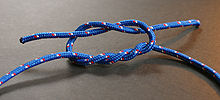This is an old revision of this page, as edited by Wayne Slam (talk | contribs) at 01:35, 7 November 2010 (Reverted edits by Vfgdarin (talk) to last revision by XLinkBot (HG)). The present address (URL) is a permanent link to this revision, which may differ significantly from the current revision.
Revision as of 01:35, 7 November 2010 by Wayne Slam (talk | contribs) (Reverted edits by Vfgdarin (talk) to last revision by XLinkBot (HG))(diff) ← Previous revision | Latest revision (diff) | Newer revision → (diff)| Surgeon's knot | |
|---|---|
 The surgeon's knot before tightening showing the two twists in the bottom and the one on top. The surgeon's knot before tightening showing the two twists in the bottom and the one on top. | |
| Names | Surgeon's knot, Ligature knot |
| Category | Binding |
| Category 2 | Bend |
| Related | reef knot, Double overhand knot |
| ABoK | #461, #463, #1209 |
The surgeon's knot is a simple modification to the reef knot. It adds an extra twist when tying the first throw, forming a double overhand knot, thus adding friction which makes the knot more secure. This knot is commonly used by surgeons in situations where it is important to maintain tension on a suture, giving it its name. Surgeon's knots are used in fly fishing, in tying quilts, and for tying knots with twine.
Some sources categorize the surgeon's knot as a bend, since it can be effective as such.
Like the reef knot, the surgeon's knot capsizes and fails easily if one of the working ends is pulled away from the standing end closest to it.

See also
References
- Geoffrey Budworth, The Ultimate Encyclopedia of Knots (London: Hermes House, 1999), 54.
External links
 | This knot-related article is a stub. You can help Misplaced Pages by expanding it. |